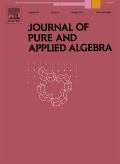
JOURNAL OF PURE AND APPLIED ALGEBRA
Scope & Guideline
Exploring the Depths of Pure and Applied Mathematics
Introduction
Aims and Scopes
- Algebraic Structures:
The journal publishes research on various algebraic structures such as groups, rings, fields, and algebras, exploring their properties, classifications, and interrelations. - Homological Algebra:
Research on homological techniques, derived categories, and their applications in algebraic geometry and representation theory is a core theme. - Representation Theory:
The journal includes studies on the representation theory of algebras, groups, and categories, focusing on both finite and infinite-dimensional representations. - Algebraic Geometry:
Papers often touch on algebraic geometry topics, particularly those that intersect with algebraic structures, such as schemes and varieties. - Applications of Algebra:
The journal highlights the applications of algebraic concepts in other fields, including number theory, combinatorics, and mathematical physics. - Category Theory:
Research on categorical frameworks, including homotopy theory and derived categories, is a significant focus area, reflecting the journal's commitment to foundational aspects of mathematics.
Trending and Emerging
- Noncommutative Algebra:
There is a growing interest in noncommutative algebra, with an increasing number of papers addressing topics such as quantum groups, Hopf algebras, and their applications. - Higher Category Theory:
Research in higher category theory is on the rise, with papers exploring its implications for algebraic structures and homotopy theory, indicating a shift towards more abstract and generalized frameworks. - Algebraic Topology Intersections:
The intersection of algebra with algebraic topology and homotopy theory is trending, reflecting an integrated approach to understanding algebraic structures. - Computational Algebra:
Emerging themes in computational methods within algebra are gaining attention, with researchers exploring algorithms and computational techniques related to algebraic objects. - Homotopical and Derived Methods:
The use of homotopical and derived methods in algebra is becoming more prevalent, with researchers investigating their applications in various algebraic contexts. - Applications in Mathematical Physics:
There is a notable increase in papers that explore the applications of algebraic theories in mathematical physics, particularly in areas like quantum algebra and representation theory.
Declining or Waning
- Classical Group Theory:
While still relevant, classical group theory topics have seen a decrease in publication frequency, possibly due to the rise of more abstract frameworks and computational methods in algebra. - Elementary Number Theory:
Papers focusing solely on elementary number theory aspects have diminished, as the journal increasingly prioritizes research that integrates algebra with other mathematical disciplines. - Traditional Algebraic Geometry:
Research centered on traditional aspects of algebraic geometry has waned, likely as more complex and abstract algebraic concepts gain traction. - Real Analysis Applications:
The application of algebraic concepts to real analysis is less frequently explored in recent publications, indicating a shift towards more abstract algebraic theories.
Similar Journals

MICHIGAN MATHEMATICAL JOURNAL
Fostering Collaboration in Cutting-Edge Mathematical ResearchThe MICHIGAN MATHEMATICAL JOURNAL is a prestigious and influential publication in the field of mathematics, founded by the University of Michigan. With an ISSN of 0026-2285 and an E-ISSN of 1945-2365, this journal is recognized for its high-quality research and has achieved a commendable Q1 ranking in the category of Mathematics (miscellaneous) as of 2023. Published by the esteemed Michigan Mathematical Journal, it provides a platform for the dissemination of innovative mathematical theories and findings, playing a crucial role in advancing knowledge and scholarship within the mathematical community. With coverage spanning from 1996 to 2024, the journal emphasizes rigorous theoretical development and fosters collaboration among researchers, professionals, and students alike. While not an open-access journal, its contributions are invaluable for those looking to stay abreast of cutting-edge mathematical research.
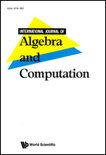
INTERNATIONAL JOURNAL OF ALGEBRA AND COMPUTATION
Pioneering Research in Algebra and Computational TheoryThe INTERNATIONAL JOURNAL OF ALGEBRA AND COMPUTATION, published by WORLD SCIENTIFIC PUBL CO PTE LTD, is a prominent platform in the field of mathematics, specifically focusing on algebraic structures and computational methods. With a publication history dating back to 1996 and converging to 2024, this journal has established a significant presence within the academic community, as reflected in its Q2 category ranking in Mathematics and its position in the Scopus 45th percentile for General Mathematics. Although it does not offer Open Access, researchers can access a wealth of original research articles, comprehensive reviews, and groundbreaking findings that contribute to the advancement of mathematical theory and its applications. This journal not only serves as an invaluable resource for mathematicians but also encourages interdisciplinary research by appealing to professionals and students alike who seek to deepen their understanding of algebra and computation methodologies.
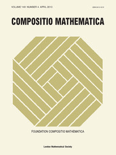
COMPOSITIO MATHEMATICA
Connecting Ideas and Insights in Algebra and Number TheoryCOMPOSITIO MATHEMATICA, published by Cambridge University Press, is a leading journal in the field of mathematics, with a specific focus on algebra and number theory. With an impressive impact factor and ranked in the Q1 quartile for its category, it holds a prominent position in the academic landscape, currently standing at Rank #26 out of 119 journals in its field, within the 78th percentile of its category, according to Scopus rankings. Since its inception in 1996, the journal has been dedicated to publishing high-quality research articles that contribute significantly to the advancement of mathematical knowledge and theory. While it does not offer open access, the journal ensures a rigorous peer-review process that upholds the highest academic standards. Researchers, professionals, and students alike are encouraged to engage with the rich, innovative content of COMPOSITIO MATHEMATICA, which continues to foster a vibrant scholarly community dedicated to exploration and discovery in mathematics.
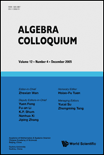
ALGEBRA COLLOQUIUM
Empowering Mathematical Minds Through Rigorous ResearchALGEBRA COLLOQUIUM is a prominent journal dedicated to advancing the field of mathematics, specifically focusing on Algebra and Number Theory as well as Applied Mathematics. Published by World Scientific Publishing Co Pte Ltd, this journal is based in Singapore and has been a cornerstone in mathematical research since its inception in 1996, with an anticipated convergence through 2024. With an ISSN of 1005-3867 and E-ISSN of 0219-1733, it features rigorous peer-reviewed papers that cover a diverse range of topics within its scope. Reflecting its quality, Algebra Colloquium is ranked in the Q3 quartile in both Algebra and Number Theory as well as Applied Mathematics, indicating its significance amidst a competitive publication landscape. Researchers, professionals, and students looking to stay at the forefront of mathematical innovation will find a wealth of knowledge and research insights within these pages, making it an essential resource for anyone committed to deepening their understanding of algebraic concepts and techniques.

APPLIED CATEGORICAL STRUCTURES
Exploring the Depths of Theoretical InnovationApplied Categorical Structures is a prominent journal published by Springer, dedicated to the dissemination of high-quality research in the intersecting domains of algebra, number theory, and theoretical computer science. Since its inception in 1993, this journal has fostered academic discussion and innovation, contributing significantly to the advancement of categorical methodologies in these fields. With an impressive 2023 Q2 ranking in both Algebra and Number Theory, and Computer Science categories, it reflects a strong standing in the scientific community, positioning itself as a valuable resource for scholars. The absence of an Open Access model allows for a traditional subscription-based distribution, providing readers with curated, peer-reviewed articles that ensure academic integrity. Aspiring authors and researchers are encouraged to publish their work here, where their contributions will resonate across a vibrant network of professionals prioritizing cutting-edge development in categorical theory and its applications.

JOURNAL OF THE AMERICAN MATHEMATICAL SOCIETY
Transforming Ideas into Mathematical BreakthroughsThe Journal of the American Mathematical Society (ISSN: 0894-0347; E-ISSN: 1088-6834), published by the American Mathematical Society, stands as a pillar in the fields of mathematics and applied mathematics. This prestigious journal, with a remarkable impact factor and ranking in the top tier (*Q1*) within both the Applied Mathematics and general Mathematics categories, is recognized for its contribution to advancing mathematical research and theory. With data reflecting it as the 8th ranked journal in General Mathematics (top 2%) and the 34th in Applied Mathematics (top 6%), the journal consistently showcases groundbreaking studies and innovative methods that greatly influence academia and industry alike. Though not an open-access journal, it offers a wealth of resources and intellectual discourse for researchers, professionals, and students alike. Specializing in comprehensive and theoretical aspects of mathematics, the Journal remains dedicated to publishing articles that promote understanding and propel the field forward, highlighting its significance as an essential tool for those engaged in mathematical research.

Selecta Mathematica-New Series
Exploring the Depths of Mathematical and Physical Theories.Selecta Mathematica-New Series is a premier academic journal published by Springer International Publishing AG, based in Switzerland. With an impressive impact in the fields of Mathematics and Physics, it is recognized in the Q1 category for both Mathematics (Miscellaneous) and Physics and Astronomy (Miscellaneous) as of 2023. Established in 1995, the journal provides a platform for rigorous peer-reviewed research, facilitating the dissemination of groundbreaking findings and theoretical advancements through its converged publication years up to 2024. Researchers and scholars seeking to stay at the forefront of mathematical and physical sciences will benefit from the journal's diverse scope and high-impact articles. Although it does not operate under an open-access model, Selecta Mathematica-New Series remains a vital resource for building knowledge and fostering collaboration among professionals and students engaged in these dynamic fields. Access to its content is essential for those aiming to deepen their understanding and contribute to the ongoing dialogue within the scientific community.
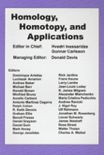
Homology Homotopy and Applications
Unlocking New Dimensions in Mathematical SciencesHomology Homotopy and Applications is a prestigious peer-reviewed journal published by INT PRESS BOSTON, INC, dedicated to advancing the field of mathematics, particularly within the realms of algebraic topology, homological algebra, and their applications. With an impressive Q1 classification in the mathematics category for the year 2023, this journal serves as a crucial platform for researchers, professionals, and students aiming to disseminate their findings in a rapidly evolving discipline. Although open access options are not currently available, the journal retains significant value with its rigorous selection process and high-impact studies. The journal invites submissions that explore theoretical developments as well as practical applications that bridge homology and homotopy theories, thus contributing to the broader scientific community from its base in the United States. With convergence covering years from 2001 to 2024, Homology Homotopy and Applications continues to be a vital resource for fresh insights and groundbreaking research in mathematical sciences.
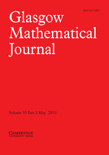
GLASGOW MATHEMATICAL JOURNAL
Elevating the standards of mathematical research and discourse.GLASGOW MATHEMATICAL JOURNAL is a prestigious academic publication in the field of mathematics, published by Cambridge University Press since its inception in 1967. This journal, with an ISSN of 0017-0895 and an E-ISSN of 1469-509X, provides a platform for innovative and high-quality research articles, fostering the advancement of mathematical sciences globally. Covering a broad scope, including various subfields, the journal has been recognized in the top quartile (Q2) of the Mathematics (miscellaneous) category according to 2023 rankings, solidifying its importance and credibility within the academic community. The journal is committed to disseminating rigorous research, making it an invaluable resource for researchers, professionals, and students alike, who are keen to stay abreast of the latest developments in the mathematical landscape. By choosing the GLASGOW MATHEMATICAL JOURNAL, authors ensure their work reaches a discerning audience, while readers gain access to cutting-edge theoretical and applied mathematical insights.

New York Journal of Mathematics
Fostering innovation in the world of mathematics.New York Journal of Mathematics is a prominent open-access journal, published by the ELECTRONIC JOURNALS PROJECT, dedicated to advancing the field of mathematics through the dissemination of groundbreaking research. Since its inception in 1996, the journal has evolved into a valuable resource for researchers, educators, and students, particularly in the realm of general mathematics. As of 2023, it proudly holds a Q2 classification in the Mathematics (miscellaneous) category, reflecting its growing impact and reach within the academic community, despite being ranked at the 31st percentile overall. With its commitment to open access since 2022, the journal ensures that high-quality mathematical research is readily available to a global audience, fostering collaboration and innovation. Researchers interested in contributing to this dynamic field will find the journal a vital platform for sharing their findings and engaging with fellow mathematicians around the world.